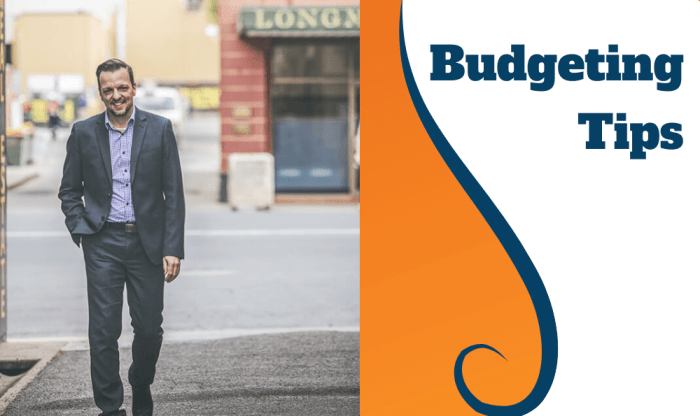Budgeting tips are crucial for securing your financial future and achieving your money goals. From creating a budget to saving money effectively, these tips will set you on the path to financial success.
Importance of Budgeting
Budgeting is essential for maintaining financial health as it allows individuals to track their income and expenses, ensuring they are living within their means. By creating a budget, people can allocate funds towards savings, debt repayment, and other financial goals, helping them achieve financial stability and security.
Benefits of Budgeting
- Helps prioritize spending and distinguish between needs and wants.
- Provides a clear overview of financial situation and helps in making informed decisions.
- Prevents overspending and accumulating unnecessary debt.
- Allows for planning for emergencies and unexpected expenses.
- Encourages saving and investment for future financial goals.
Creating a Budget

Creating a personal budget is essential for managing your finances effectively. By setting a budget, you can track your income and expenses, prioritize your spending, and work towards your financial goals.
Step-by-Step Guide to Creating a Personal Budget
- List all sources of income: Include your salary, side hustle earnings, and any other income streams.
- Calculate your expenses: Break down your expenses into fixed (rent, utilities) and variable (groceries, entertainment) categories.
- Set financial goals: Determine what you want to achieve with your money, whether it’s saving for a vacation or paying off debt.
- Allocate your income: Use budgeting methods like the 50/30/20 rule (50% essentials, 30% wants, 20% savings) or zero-based budgeting (assigning every dollar a job).
- Track your spending: Keep tabs on your expenses through apps, spreadsheets, or pen and paper to ensure you’re staying within your budget.
Different Budgeting Methods
- The 50/30/20 rule: A simple guideline that helps you allocate your income towards essentials, wants, and savings in percentages.
- Zero-based budgeting: Every dollar you earn is assigned a specific purpose, ensuring that your income minus expenses equals zero.
Tips for Tracking Expenses Effectively
- Use budgeting apps: Platforms like Mint, YNAB, or Personal Capital can automate expense tracking and provide insights into your spending habits.
- Keep receipts and records: Save receipts, bills, and statements to cross-reference with your budget and identify areas where you can cut back.
- Review regularly: Check your budget weekly or monthly to see if you’re on track and make adjustments as needed.
Budgeting Tools and Apps

Budgeting tools and apps can make managing your finances easier and more efficient. These tools offer various features to help you track your expenses, set financial goals, and stay on budget.
Popular Budgeting Apps
- Mint: Mint is a popular budgeting app that allows you to link your bank accounts, track your spending, and create a budget. It also provides personalized money-saving tips and alerts for unusual account activity.
- YNAB (You Need A Budget): YNAB focuses on giving every dollar a job and helps users prioritize their spending. It offers goal tracking, debt paydown tools, and live workshops to improve financial literacy.
- PocketGuard: PocketGuard connects all your financial accounts in one place and categorizes your transactions automatically. It also helps you track bills, subscriptions, and even potential savings opportunities.
Personal Experiences with Budgeting Tools
- Using Mint has helped me visualize where my money is going each month and identify areas where I can cut back on expenses.
- YNAB’s zero-based budgeting approach has been instrumental in helping me allocate funds for different purposes and avoid overspending.
- PocketGuard’s simplistic interface and budget tracking tools have made it easier for me to stay on top of my financial goals and adjust my spending habits accordingly.
Saving Money Through Budgeting: Budgeting Tips
Budgeting is not just about managing expenses but also about saving money effectively. By setting savings goals within your budget, you can prioritize putting money aside for future needs or emergencies. Here are some tips on how to save money through budgeting:
Cutting Expenses
- Track your expenses to identify areas where you can cut back. Look for unnecessary spending habits that can be eliminated.
- Consider negotiating bills or subscriptions to get better deals and save money each month.
- Avoid impulse purchases by creating a shopping list and sticking to it when you go to the store.
- Try to reduce dining out and cook meals at home more often to save on food expenses.
Increasing Savings, Budgeting tips
- Automate your savings by setting up automatic transfers from your checking account to your savings account each month.
- Consider setting up a separate savings account for specific goals, such as a vacation or a down payment on a house.
- Look for ways to increase your income, such as taking on a side hustle or selling items you no longer need.
- Review your budget regularly and make adjustments to maximize your savings potential.
